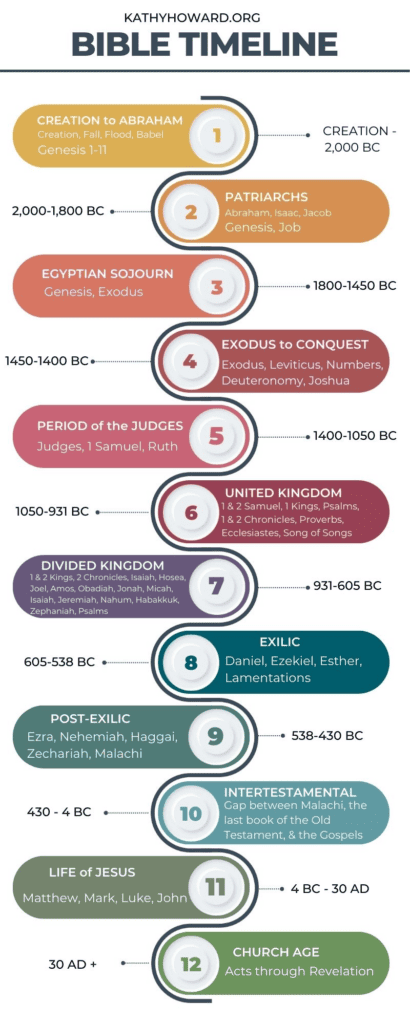
Do you feel you have a grasp of the overall timeline of the Bible? Since the books in the Bible are not organized chronologically, it’s easy to get confused about where the different Bible books fall historically. Since it helps me to step back and see the big picture, I thought you might like an overview too. (You may also be interested in “How is the Bible Organized?”)
Dates for biblical events before the time of Israel’s monarchy are only approximates. These dates are educated guesses based on biblical clues and what we know of ancient history. That’s why you’ll see slightly different dates for the life of Abraham, the exodus from Egypt, and the conquest of the Promised Land depending on what you read. (The dates I share in the chart are considered to be the more traditional dates.) Dates become more firm beginning around the time of King David because we have more details to ground the timeline of the Bible in world history.
Major Periods in the Timeline of the Bible
To aid our grasp of the Bible, its scope is often divided into major historical periods. These periods trace God’s rule, reign, and redemptive purposes in the world as carried out through His chosen people and ultimately through Jesus Christ.
I used a number of resources to put together the Bible Timeline printable in this post. You can download it, print it, and keep it your Bible for quick and easy reference. Notice the chart includes the historical period, the dates, and the time relevant Bible books. (See “What is the Bible’s Post-Exilic Period?“)
The events of some historical Bible books fall in more than one time period so you’ll see them listed twice. Psalms falls in more than one time period because the individual psalms were written and collected over centuries. Many scholars think that Job lived during the time of the patriarchs, but they don’t know who wrote it or when.
CHECK OUT THESE OTHER GREAT TIMELINES OF THE BIBLE
http://timeline.biblehistory.com/home

Major Events within the Historical Periods
So many major events happened within each historical period on the timeline. There simply wasn’t room to include everything. But a few events were so significant, I thought I should at least mention them here.
PATRIARCHS
- Call of Abraham (Genesis 12)
- Abrahamic Covenant (Genesis 15)
EXODUS TO CONQUEST
- Call of Moses through burning bush (Exodus 3)
- Exodus of Jews from Egypt (Exodus 12-14)
- Establishment of the Old Covenant/10 Commandments (Exodus 19-24)
- Jews enter the Promised Land (Joshua 3)
UNITED KINGDOM
- Anointing of David by Samuel (1 Samuel 16)
- Dedication of Solomon’s Temple (1 Kings 8 & 2 Chronicles 7)
DIVIDED KINGDOM
- Fall of the northern kingdom of Israel to Assyria in 722 BC (2 Kings 17 &
- Final deportation of southern kingdom, fall of Jerusalem, and destruction of the temple by Babylon in 586 BC (2 Kings 25 & 2 Chronicles 36)
EXILIC/POST-EXILIC
- Persia’s king Cyrus’ degree to send Jews back to Jerusalem in 538 BC (2 Chronicles 36 & Ezra 1)
- Completion of 2nd temple in 515 BC (Ezra 6)
LIFE of JESUS
- Birth of Jesus in 4 BC (Matthew 1, Luke 2)
- Death and Resurrection of Jesus in 30 AD (Matthew 27-28, Mark 15-16, Luke 23-24, John 19-20)
CHURCH AGE
- Arrival of the Holy Spirit on Day of Pentecost (Acts 2)
- Conversion of Saul of Tarsus (Acts 9)
- Destruction of 2nd Temple by Rome in 70 AD (This event is not described in a historical account in the Bible. However, it was prophesied in Scripture and many scholars believe its rebuilding holds a significant place in end time events.)
Have you been confused over the Bible’s timeline? Is so, what part has been most confusing?


Titus Bible Study
Join Kathy's mailing list to receive a free mini Bible study on the book of Titus.
Success! Check your inbox for the download link.